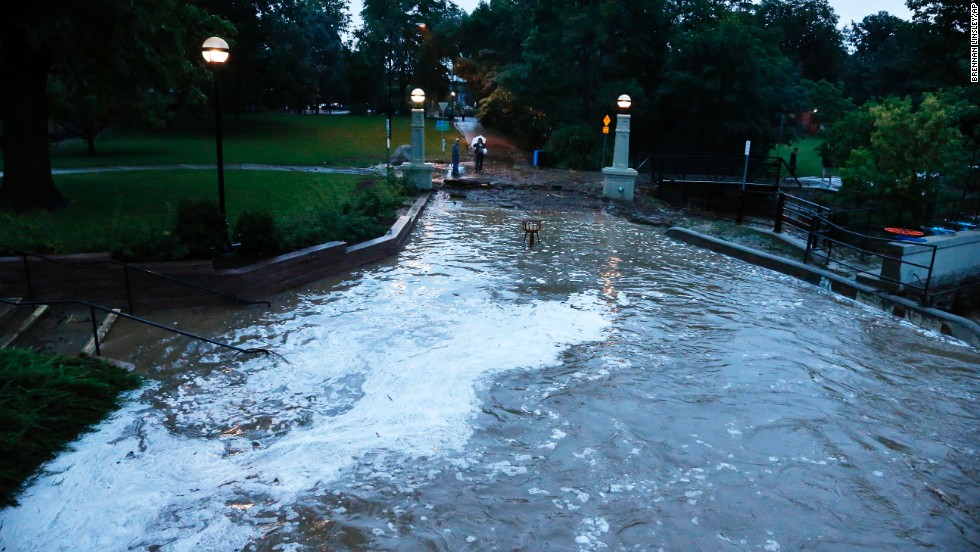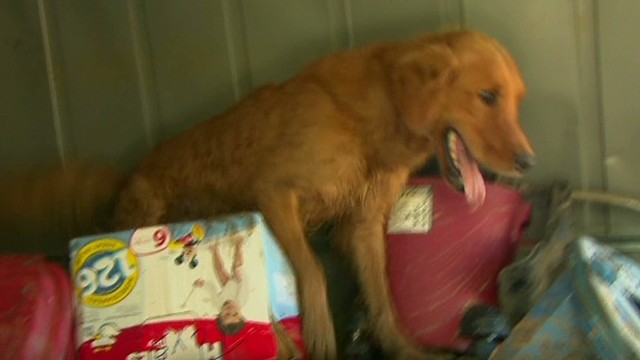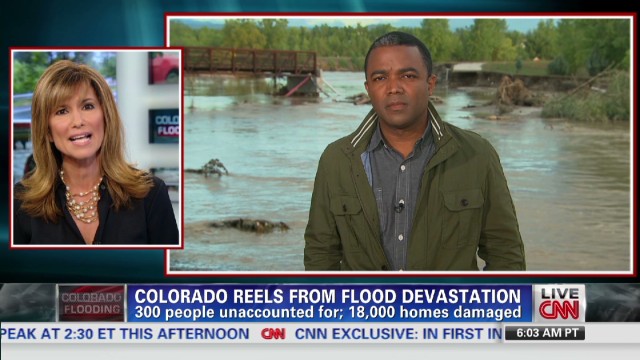Deadly floods hit Colorado
Deadly floods hit Colorado – Railroad tracks washed from their path by floodwaters are seen in Longmont on Thursday, September 19, 2013. Massive flooding has left at least six people dead and damaged thousands of homes around the state.
Deadly floods hit Colorado
Deadly floods hit Colorado – Piles of items destroyed by flooding line both sides of a street in Longmont on September 19.
Deadly floods hit Colorado
Deadly floods hit Colorado – A woman disposes of ruined items from her home in Longmont on Wednesday, September 18.
Deadly floods hit Colorado
Deadly floods hit Colorado – David Soleta, right, and family friend John Rice remove destroyed and contaminated walls on September 18 from Soleta's father-in-law's home, which was heavily damaged by floodwaters that swept through Longmont.
Deadly floods hit Colorado
Deadly floods hit Colorado – From left, siblings Elizabeth, 13, Jonathan, 9, Aaron, 11, and Kitty Dipert, 6, wash mud from the clothing of family friends from church on September 18 in Longmont, Colorado.
Deadly floods hit Colorado
Deadly floods hit Colorado – An abandoned car sits on a destroyed road along the South Platte River near Greeley, Colorado, on Tuesday, September 17.
Deadly floods hit Colorado
Deadly floods hit Colorado – A Blackhawk helicopter flies over a canyon during a search around Boulder, Colorado, on September 17.
Deadly floods hit Colorado
Deadly floods hit Colorado – Two women are hoisted into a Blackhawk helicopter during a search and rescue mission near Jamestown, Colorado, on September 17.
Deadly floods hit Colorado
Deadly floods hit Colorado – Two women smile and laugh after being rescued by a helicopter crew on September 17 near Jamestown, Colorado.
Deadly floods hit Colorado
Deadly floods hit Colorado – Members of the FEMA Urban Search and Rescue Nebraska Task Force 1 use probes to test for water depth while crossing floodwaters looking for missing people near Longmont, Colorado, on September 17. Stranded flood victims are being rescued by military helicopters and vehicles.
Deadly floods hit Colorado
Deadly floods hit Colorado – A cow stands in floodwater near Kersey, Colorado, on September 17.
Deadly floods hit Colorado
Deadly floods hit Colorado – From left, Dale Reeves, Kathryn Reeves and Trent Mayes assist a family member by moving belongings from a flooded home in Evans, Colorado, on September 17.
Deadly floods hit Colorado
Deadly floods hit Colorado – A gas well is surrounded by floodwater near Kersey, Colorado, on September 17.
Deadly floods hit Colorado
Deadly floods hit Colorado – A woman steps over a puddle onto the foundation of a shed that was moved by floodwaters in Hygiene, Colorado, on Monday, September 16.
Deadly floods hit Colorado
Deadly floods hit Colorado – People wade through floodwater in Greeley, Colorado, on September 16.
Deadly floods hit Colorado
Deadly floods hit Colorado – Jerrie McBride checks in with authorities after being rescued by helicopter from the Big Elk Meadows area in Boulder, Colorado, on September 16.
Deadly floods hit Colorado
Deadly floods hit Colorado – Local residents, from left, Levi Wolfe, Miranda Woodard, Tyler Sadar, and Genevieve Marquez help salvage and clean property after days of flooding in Hygeine, Colorado, on September 16.
Deadly floods hit Colorado
Deadly floods hit Colorado – Floodwaters surround a home in Jamestown, Colorado, on Sunday, September 15.
Deadly floods hit Colorado
Deadly floods hit Colorado – Chickens take refuge on the roof of their coop to escape floodwater in the backyard of a home in Longmont, Colorado, on September 15.
Deadly floods hit Colorado
Deadly floods hit Colorado – Railroad tracks are washed out in Longmont, Colorado, on September 15.
Deadly floods hit Colorado
Deadly floods hit Colorado – Water pours out of a parking lot, overwhelming a culvert heading under the roadway, in Estes Park, Colorado, on September 15.
Deadly floods hit Colorado
Deadly floods hit Colorado – A road crew works on a stretch of highway washed away by flooding along the South Platte River near Greeley, Colorado, on Saturday, September 14.
Deadly floods hit Colorado
Deadly floods hit Colorado – Parked vehicles sit partially submerged near Greeley, Colorado, on September 14.
Deadly floods hit Colorado
Deadly floods hit Colorado – Eli and Noe Sura play in the mud around their Boulder, Colorado, home on September 14.
Deadly floods hit Colorado
Deadly floods hit Colorado – A National Guardsman stands at South Main and Missouri streets in Longmont, Colorado, on September 14.
Deadly floods hit Colorado
Deadly floods hit Colorado – Floodwaters swamp Longmont, Colorado, on September 14.
Deadly floods hit Colorado
Deadly floods hit Colorado – Dave Jackson closes a mailbox with his foot after delivering the mail to a home surrounded by water from the flooded Cheyenne Creek in Colorado Springs, Colorado, on Friday, September 13.
Deadly floods hit Colorado
Deadly floods hit Colorado – Rescue personnel search for flood victims near Fort Collins, Colorado, on September 13.
Deadly floods hit Colorado
Deadly floods hit Colorado – Chris Rodes helps Fred Rob salvage a friend's belongings after floods left homes and infrastructure in shambles in Lyons, Colorado, on September 13.
Deadly floods hit Colorado
Deadly floods hit Colorado – During a break in the rain, a woman walks over a footbridge past the raging Boulder Creek in Boulder on September 13. Boulder County is one of the hardest-hit areas.
Deadly floods hit Colorado
Deadly floods hit Colorado – Suzanne Sophocles hugs her dogs after they were rescued from her flooded home on September 13 in Boulder. Thousands of people stranded by the flood waters in Colorado were finally able to come down by trucks and helicopters, two days after seemingly endless rain turned normally scenic rivers and creeks into coffee-colored rapids that wrecked scores of roads and wiped out neighborhoods.
Deadly floods hit Colorado
Deadly floods hit Colorado – Residents look at the flood damage along Topaz Street in Boulder on September 13.
Deadly floods hit Colorado
Deadly floods hit Colorado – Will Pitner gets rescued by emergency workers and neighbor Jeff Writer on September 13 after he spent a night trapped outside above his home at the base of Boulder Canyon.
Deadly floods hit Colorado
Deadly floods hit Colorado – Water rushes where a bridge collapsed in a flash flood in Lyons, on September 13.
Deadly floods hit Colorado
Deadly floods hit Colorado – A man runs through the floodwaters in a yard in Boulder on September 13.
Deadly floods hit Colorado
Deadly floods hit Colorado – Topaz Street resident Jake Koplen stands at the edge of his driveway after the street in front of his home was washed away in Boulder on September 13.
Deadly floods hit Colorado
Deadly floods hit Colorado – Siblings Patrick Tinsley and Mary Kerns head to Boulder from the mountain community of Magnolia, Colorado, on September 13.
Deadly floods hit Colorado
Deadly floods hit Colorado – Samantha Kinzig of Longmont, Colorado, and her 5-year-old daughter, Isabel, take a closer look at the damaged bridge on Weld County Road 1 on September 13.
Deadly floods hit Colorado
Deadly floods hit Colorado – Highway 7 is completely blown out from the South St. Vrain River as a torrent of raging water rips through it about 12 miles west of Lyons on Thursday, September 12.
Deadly floods hit Colorado
Deadly floods hit Colorado – A woman looks at the flooded Boulder Creek on September 12.
Deadly floods hit Colorado
Deadly floods hit Colorado – Three vehicles crashed into a creek after the road washed out from beneath them in Broomfield, Colorado, on September 12. Three people were rescued.
Deadly floods hit Colorado
Deadly floods hit Colorado – Nicky Toor, 15, floats on the flooded lawn of North Boulder Park in Boulder on September 12.
Deadly floods hit Colorado
Deadly floods hit Colorado – Joey Schusler rides through flooded Canyon Boulevard in Boulder, on September 12.
Deadly floods hit Colorado
Deadly floods hit Colorado – Residents view a road washed out by a torrent of water after overnight flash flooding near Left Hand Canyon, Colorado, on September 12.
Deadly floods hit Colorado
Deadly floods hit Colorado – A city worker talks on his phone while surveying high water levels from Boulder Creek after flash flooding in downtown Boulder, Colorado, on September 12.
Deadly floods hit Colorado
Deadly floods hit Colorado – Flash flood waters rush over a walking path in downtown Boulder on September 12.
Deadly floods hit Colorado
Deadly floods hit Colorado – A police officer blocks off a road in Boulder on September 12.
Deadly floods hit Colorado
Deadly floods hit Colorado – A man walks past the swelled Boulder Creek in Boulder on September 12.
Deadly floods hit Colorado
Deadly floods hit Colorado – People stand at the edge of floodwaters in Boulder on September 12.
Deadly floods hit Colorado
Deadly floods hit Colorado – A dive rescue team moves toward floodwaters in Boulder on September 12.












































































































